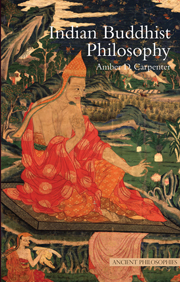Book contents
- Frontmatter
- Contents
- Preface
- Acknowledgements
- Abbreviations
- Chronology
- Development of Buddhist thought in India
- 1 The Buddha's suffering
- 2 Practice and theory of no-self
- 3 Kleśas and compassion
- 4 The second Buddha's greater vehicle
- 5 Karmic questions
- 6 Irresponsible selves, responsible non-selves
- 7 The third turning: Yogācāra
- 8 The long sixth to seventh century: epistemology as ethics
- Epilogue
- Background information
- Notes
- Bibliography
- Index
Epilogue
- Frontmatter
- Contents
- Preface
- Acknowledgements
- Abbreviations
- Chronology
- Development of Buddhist thought in India
- 1 The Buddha's suffering
- 2 Practice and theory of no-self
- 3 Kleśas and compassion
- 4 The second Buddha's greater vehicle
- 5 Karmic questions
- 6 Irresponsible selves, responsible non-selves
- 7 The third turning: Yogācāra
- 8 The long sixth to seventh century: epistemology as ethics
- Epilogue
- Background information
- Notes
- Bibliography
- Index
Summary
Also at Nālandā, perhaps just slightly after Śāntideva's ill-fated sojourn there, was the Mādhyamika Śāntarakṣita. Śāntarakṣita's stay was a happier one – he became a teacher there and, by some accounts, even the head of the great monastic university. His learning was prodigious; working more in the manner of Bhāviveka than Candrakīrti, Śāntarakṣita mastered not only the various forms of Buddhist philosophy, but also the increasingly important and energetic non-Buddhist rivals.
We encountered the Naiyāyika Uddyotakara's trenchant critique of classical Abhidharma anātmavāda in Chapter 6. A contemporary of Dharmkīrti and perhaps Candrakīrti, Uddyotakara was part of a general intensification of intellectual activity in the seventh century, involving not just Buddhists, but also non-Buddhists, particularly those working within the various Brahmanical traditions. Śaṅkara-ācārya, who would later come to have enormous influence on Indian philosophy with his contribution to Advaita Vedānta, dates from around this period, as do the two most incisive commentators on the Mīmāṃsā giant Śabara (fourth century CE): Kumārila and Prabākara. Taking the interpretation of Vedic injunctions as their special domain of inquiry, the Mīmāṃsakas developed an elaborate hermeneutics that began to stray increasingly into epistemological territory. These epistemological endeavours were in obvious ways orthogonal to the Buddhist project, aimed as they were at proving the necessary validity of the Vedas.
- Type
- Chapter
- Information
- Indian Buddhist Philosophy , pp. 232 - 240Publisher: Acumen PublishingPrint publication year: 2013



